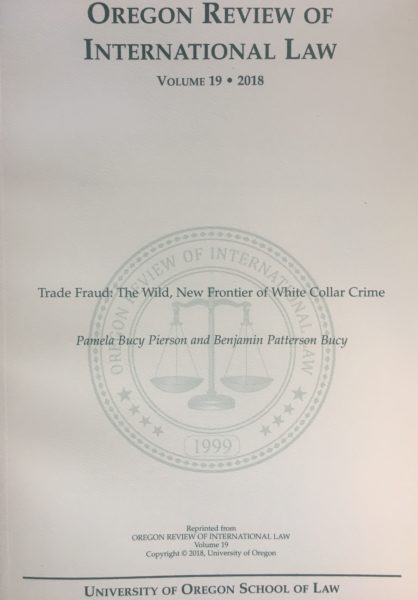Frohsin Barger & Walthall is pleased to announce that FBW attorney Ben Bucy, along his co-author Pamela Pierson, have recently published a law review article: Trade Fraud: the Wild, New Frontier of White Collar Crime in the University of Oregon School of Law, Oregon Review of International Law. This article is the first of its kind to recognize and analyze the importance of trade law enforcement and specifically the vital role of the False Claims Act and qui tam relators in prosecuting import fraud. In the current climate of increasing focus on trade law and international trade tensions, the article makes the argument that regardless of where one falls on the spectrum of international trade policy, aggressive pursuit of evaded import tariffs and duties is undeniably critical.
The False Claims Act and qui tam Relators are the Premier Tool to Prosecute Trade Fraud
The False Claims Act, long recognized as the premiere tool for pursuing fraud upon the federal and state governments, can also be effectively deployed against trade fraud. The article highlights how complex fraud is incredibly difficult to detect utilizing traditional law enforcement tactics and often only discovered through insiders, who have personal knowledge of the fraud, providing information to law enforcement.
The article examines how essentially all trade fraud cases fall into two types of fraud: misrepresentations regarding the nature of products imported, and misrepresentations regarding a product’s country of origin. Therefore, if goods are being imported to the United States and either the nature of the product or the country of origin is being misrepresented in order to decrease or avoid tariffs or duties, the False Claims Act is likely violated.
Not only does the False Claims Act allow and incentivize private individuals or businesses with knowledge of import fraud to bring a case on behalf of the United States and share in any recovery, but the punitive damages and penalties incurred by False Claims Act violations are also substantial. The False Claims Act allows the government to recover up to three times the amount it was defrauded as well as civil penalties of $5,500 – $11,000 for each false claim made.
In the context of trade fraud, the government can recover three times the amount of all tariffs or duties evaded by a defendant and $5,500 – $11,000 for each false entry declared. With these damages, False Claims Act trade fraud cases have recovered up to $45 million, with the relator or “whistleblower” in that case receiving $7.9 million. United States ex rel. Dickson v. Toyo Ink Manufacturing Co., Ltd. Similarly, Frohsin Barger & Walthall successfully recovered $3 million for the United States in United States ex rel. GES v. AmeriSource, with our client GES receiving $480,000 for informing the government about import duty fraud.
Interestingly, in both the Toyo Ink and AmeriSource cases and common in import fraud qui tam actions, competitors of the company cheating duties are the relators coming forward to expose their competitor’s fraud. As industry participants are often knowledgeable of sourcing, prices and quality of materials in the global market, they often have the requisite insider knowledge to file a qui tam action. Therefore, if a company is suffering business losses due to competitor offering prices only obtainable through import duty evasion, filing a qui tam lawsuit may be a viable course of action. The United States and the False Claims Act encourages those with such knowledge to come forward and can reward them handsomely for doing so.
The full article is available here
For more information about the False Claims Act and Trade Fraud, contact Frohsin Barger & Walthall.






Talk with an Expert
Frohsin Barger & Walthall
Call 205.933.4006 or
Send us a Message